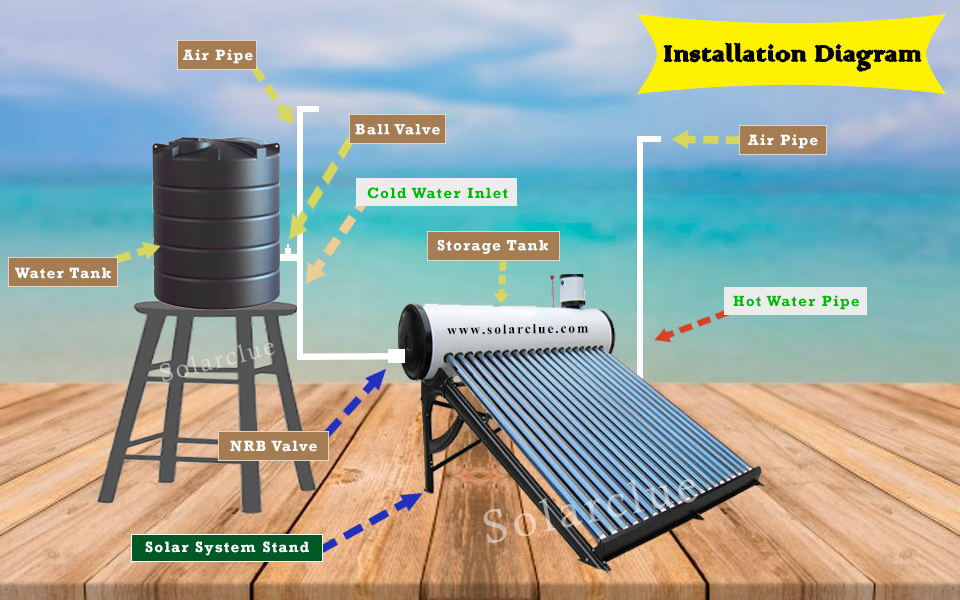As energy costs continue to rise and environmental concerns become more pressing, homeowners are increasingly turning to solar water heaters as a sustainable and cost-effective solution. A solar water heater can significantly reduce your energy bills while also lowering your carbon footprint. However, choosing the right system for your home can be a bit overwhelming, as there are many different factors to consider. In this article, we’ll walk you through the key aspects to help you make an informed decision and maximize the efficiency of your solar water heating system.
1. Understand the Types of Solar Water Heaters
Before you begin shopping for a solar water heater, it’s important to understand the different types available. There are two main categories of solar water heaters: active systems and passive systems.
- Active Systems: These rely on pumps to circulate water between the solar collectors and the storage tank. They tend to be more efficient and are ideal for homes with high hot water demand. Active systems come in two forms: direct circulation systems, which pump water directly through the collectors, and indirect circulation systems, which use a heat-transfer fluid to carry the heat to the water.
- Passive Systems: These systems do not rely on pumps; instead, they rely on natural convection to circulate water. Passive systems are simpler and less expensive than active systems, but they may not be as efficient in colder climates or areas with higher hot water demand.
The best type for you will depend on your specific needs, budget, and location.
2. Evaluate Your Hot Water Needs
One of the most important factors to consider when choosing a solar water heater is your home’s hot water demand. Homes with larger families or higher water usage will need a more powerful system to meet their needs. To determine the size of the system, you’ll need to consider the number of people in your household, how much hot water you use daily, and the climate in your region.
- For homes with more than four people or higher water consumption, an active system with a larger collector area and storage tank may be necessary to ensure consistent hot water supply.
- Smaller homes or those with moderate water needs might benefit from a smaller passive system, which is more affordable and easier to maintain.
3. Consider Your Location and Climate
The climate in your area plays a significant role in the efficiency of your solar water heater. If you live in a sunny region, a solar water heater will perform exceptionally well, providing a reliable and cost-effective hot water supply year-round. However, if you live in a region with less sunlight or frequent cloudy days, you may need to invest in a larger system or a system with a backup heating option to ensure you have enough hot water during less sunny periods.
In colder climates, it’s also essential to consider freeze protection features, especially for passive systems. Active systems, on the other hand, are generally more adaptable to various weather conditions.
4. Assess the Efficiency of the System
Efficiency is key when choosing a solar water heater. The higher the efficiency, the more heat it can absorb from the sun, which translates into lower energy bills. Look for systems that have high-quality solar collectors, as these will capture more sunlight and convert it into usable heat. The efficiency of the system will also depend on the type of collector used:
- Flat Plate Collectors: These are the most common and effective collectors. They consist of a dark, heat-absorbing surface, and a layer of insulation to minimize heat loss.
- Evacuated Tube Collectors: These collectors are more efficient in colder climates because they trap heat more effectively. They are ideal for areas with limited sunlight or where freezing temperatures are common.
Check the energy performance ratings and reviews to gauge how well the system performs in various weather conditions.
5. Look for a System with a Long Lifespan and Low Maintenance
Investing in a solar water heater is a long-term commitment, so it’s important to choose a system that will last for many years with minimal maintenance. Look for high-quality materials that are resistant to corrosion, such as stainless steel or titanium. The collector panels should be durable and able to withstand harsh weather conditions.
Additionally, consider systems that are easy to maintain. While solar water heaters generally require less maintenance than traditional water heaters, they should still be regularly cleaned and checked for any potential issues. Passive systems, with fewer moving parts, tend to require less maintenance compared to active systems.
6. Take Into Account the Cost and Incentives
The upfront cost of a solar water heater can be substantial, but it’s important to look at the long-term savings. Solar water heaters reduce your reliance on electricity or gas, resulting in lower energy bills over time. Make sure to account for the total cost of installation, including any additional components like the storage tank, piping, and any necessary backup heating systems.
Many regions offer incentives, rebates, and tax credits to help reduce the initial cost of solar water heaters. Be sure to research the available incentives in your area to maximize your investment.
7. Choose a Reputable Installer
Finally, choosing a qualified and experienced installer is critical to the efficiency and longevity of your solar water heater. Look for a company with a proven track record in solar installations, as this will ensure the system is installed correctly and operates at peak efficiency. A professional installer will also help you choose the best system for your home and provide guidance on maintenance.
Conclusion
Choosing the best solar water heater for your home requires careful consideration of several factors, including the type of system, your water usage, climate, efficiency, and budget. By taking the time to evaluate your options, you can select a system that maximizes your energy savings, minimizes your carbon footprint, and provides consistent hot water for years to come. With the right system in place, you’ll not only reduce your energy bills but also contribute to a more sustainable future.







